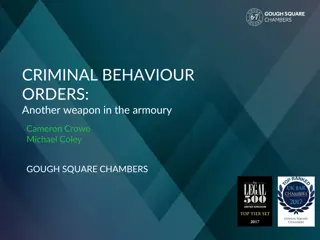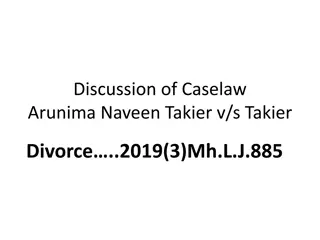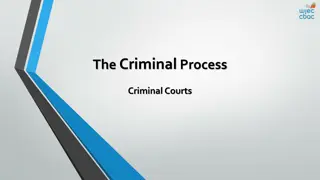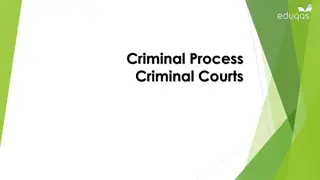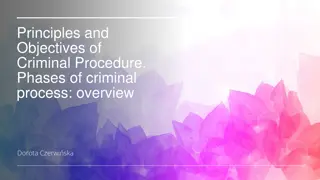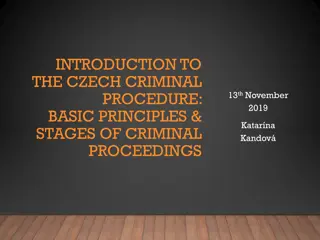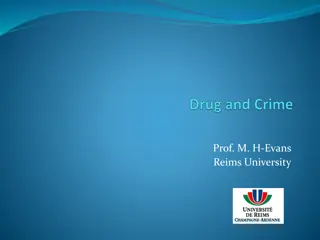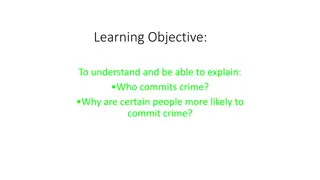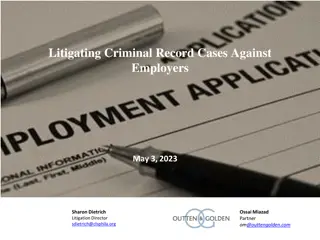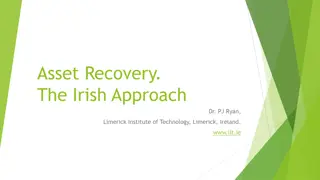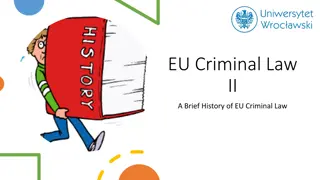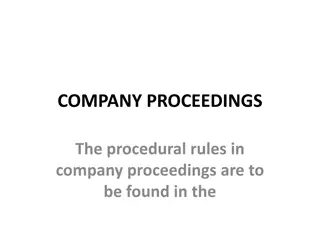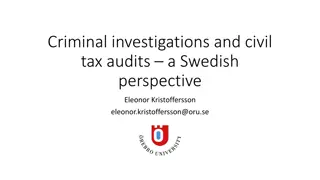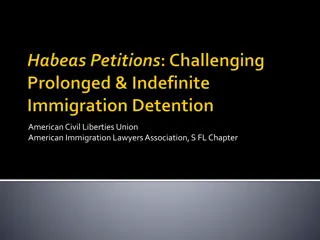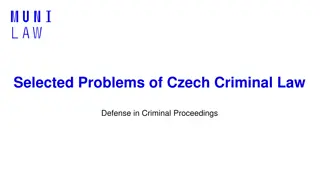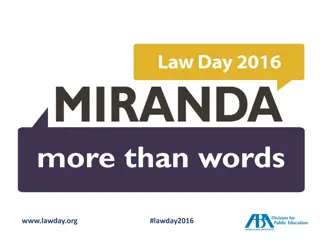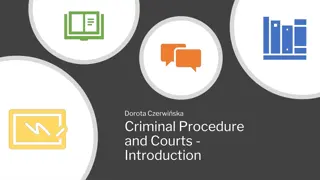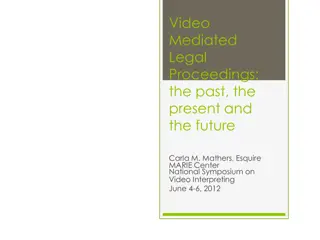Insights into TMA Proceedings and Trademark Decisions
Explore data on TMA proceedings from December 2021 to February 2024, including expungement and reexamination statistics, filing bases, raw numbers, and USPTO activities. Gain valuable information on trademark decisions and proceedings, along with insights into post-registration audit program statist
0 views • 10 slides
United Nations Survey on Crime Trends and Operations of Criminal Justice Systems
The United Nations Survey on Crime Trends and Operations of Criminal Justice Systems (UN-CTS) focuses on harmonizing data collection, identifying crime patterns, improving monitoring of the criminal justice system, and enhancing international comparability of crime statistics. It was mandated by the
3 views • 18 slides
Overview of Joint Accelerator Conferences Activities
The report provides insights into the activities and support for conferences by the Joint Accelerator Conferences Website, including regional support centers and conference proceedings management. It covers the deployment of the SPMS system, synchronization of future and past conferences, status of
0 views • 6 slides
Harmonisation of Substantive Criminal Law in the EU
The Treaty of Lisbon serves as a legal foundation for the harmonisation of substantive criminal law within the European Union. It establishes the basis for judicial cooperation, mutual recognition of judgments, and approximation of laws across Member States. The treaty allows for the establishment o
2 views • 60 slides
Understanding Criminal Behavior from a Social Psychological Perspective
This unit delves into the application of social psychology in the legal system, exploring the nature of criminal behavior, responses to criminal acts, the criminal justice system, and rehabilitation. It examines the social ecological perspective of criminal acts and outlines key points related to th
0 views • 50 slides
Understanding Psychological Theories of Criminal Behavior
Psychologically-based criminologists attribute criminal behavior to individual factors such as negative early childhood experiences and inadequate socialization, leading to criminal thinking patterns and incomplete cognitive development. Probation and parole practices are influenced by rehabilitatio
1 views • 30 slides
Understanding Criminal Law and Procedure: Greenvisor's Case
A case study involving embezzlement by Joe Greenvisor, the chief accountant of Nobreath Corporation, sheds light on criminal acts, duties, intent, and societal perspectives on crime. Despite Greenvisor's charitable intentions, his actions constituted a crime under the law. The elements of criminal a
0 views • 47 slides
Evidential Barriers Faced by Persons with Disabilities in Criminal Proceedings - NDA Annual Conference 2020
Understanding the challenges faced by individuals with disabilities in criminal proceedings, this presentation at the NDA Annual Conference 2020 delves into Ireland's legal landscape, including special measures under the Criminal Evidence Act 1992 and key barriers to obtaining best evidence. Dr. Ala
0 views • 20 slides
Probate in Wyoming and Colorado: Essential Guide for Landmen
Probate is the legal process of transferring a deceased person's property to a living individual. Whether probate is necessary depends on how assets were owned at the time of death. In Wyoming and Colorado, probate proceedings vary based on different ownership structures. Establishing the death of a
5 views • 30 slides
Understanding Criminal Offences: A Comparative Analysis
Exploring the concept of criminal offences, this article delves into the definitions in common law and continental law systems. It discusses the structural elements, harmful nature, prohibition, punishment, and distinctive aspects of criminal acts. A comparison between common law and continental law
1 views • 33 slides
The Role of a Court Clerk in Manitoba
Court clerks play a vital role in the judicial system of Manitoba, assisting in court proceedings, maintaining order in the courtroom, recording decisions accurately, and handling sensitive evidence. They are responsible for various duties such as monitoring court proceedings, preparing dockets, han
0 views • 16 slides
Legal Provisions on Admission and Confession in Criminal Proceedings
The content highlights key sections related to admission and confession in criminal proceedings. It defines admission and explains the relevance of inducement, threat, or promise in a confession. It also emphasizes restrictions on confessions made to a police officer. These sections play a crucial r
0 views • 28 slides
Understanding Criminal Competency in Legal Proceedings
Competency in criminal cases is crucial for ensuring the accuracy and fairness of legal proceedings. Adjudicative competence, based on standards like the Dusky Standard, relates to a defendant's ability to understand and engage in legal processes. Mistaken beliefs, such as equating clinical disorder
2 views • 12 slides
Understanding the Process of Sealing Criminal Records
Having a criminal record sealed means making it inaccessible to the public while keeping it available to criminal justice agencies. Eligibility for sealing records requires taking action, and not everyone qualifies. This clinic provides guidance on the sealing process and the types of records that c
0 views • 36 slides
Understanding the Roles in Criminal Justice System
The criminal justice system involves three branches of government, each with specific responsibilities, operating at federal, state, and local levels. Law enforcement is primarily a local government function, while legislatures determine criminal laws and punishments. Statutes organized into codes d
0 views • 35 slides
Understanding Substantive Criminal Law in the American Legal System
Substantive criminal law encompasses the definition of criminal acts and penalties, with a core principle being that there can be no crime without a corresponding law. The American legal system follows the Rule of Law, ensuring that all individuals are subject to legal governance. Constitutional lim
0 views • 22 slides
Confiscation in the Criminal Courts: A Guide to Proceeds of Crime Law
Confiscation in the criminal courts involves depriving defendants of benefits gained from criminal conduct within their means. The Proceeds of Crime Law in the Cayman Islands sets guidelines for these proceedings, emphasizing that confiscation is not a form of punishment but aims to recover obtained
3 views • 17 slides
Understanding the Process of Sealing Criminal Records
Sealing criminal records means restricting public access to the records, although they are not destroyed and remain accessible to certain entities. Eligibility requirements vary, and action must be taken to seal records. This presentation covers the process, eligibility criteria, and what to expect
1 views • 36 slides
Understanding Civil and Criminal Complaints in Legal Cases
Explore the distinctions between civil and criminal complaints in legal scenarios. Learn how a civil case seeks monetary damages while a criminal case pursues punishment for wrongful actions. Understand the roles of plaintiffs and prosecutors, burden of proof, and outcomes in both civil and criminal
0 views • 34 slides
Briefing on the Criminal Procedure Amendment Bill [B12-2021] to the Portfolio Committee on Justice and Correctional Services
The Criminal Procedure Amendment Bill aims to address the constitutional invalidity of section 154(3) of the Criminal Procedure Act by enhancing protection for child victims, accused, and witnesses in criminal proceedings. The Bill proposes prohibiting the publication of information revealing their
0 views • 12 slides
Understanding Criminal Behaviour Orders: An Overview and Legal Requirements
Criminal Behaviour Orders (CBOs) are issued following conviction for criminal offences to tackle serious and persistent anti-social behavior. This talk provides an overview of CBOs, legal requirements, when they are appropriate, and practical tips for implementation. The orders can prohibit or requi
0 views • 12 slides
Asset Recovery Practices in England and Wales: Criminal vs. Civil Proceedings
Asset recovery in England and Wales involves a combination of criminal and civil proceedings to secure justice and return funds to victims of crime. The CPS's Proceeds of Crime Division plays a crucial role in obtaining Restraint Orders and Confiscation Orders. Civil recovery, focusing on illicit fi
1 views • 11 slides
Analysis of Caselaw Arunima Naveen Takier v/s Takier Divorce Proceedings 2019(3) Mh.L.J.885
The case involves a wife seeking an ex-parte interim order to stay divorce proceedings in the UK and an injunction against her husband. Despite the husband's domicile in the UK, the court maintained jurisdiction. The wife faced challenges defending herself, leading to the granting of an anti-suit in
0 views • 16 slides
Understanding the Criminal Justice System in Court Proceedings
This content explores various aspects of the criminal justice system, including the adversarial system, classification of offenses, criminal court systems, trial procedures, plea bargaining, and more. It covers models of criminal justice systems, classification of offenses, modes of trial, sending f
0 views • 15 slides
Overview of the Criminal Justice System
Exploring the complexities of the criminal justice system, this content delves into the adversarial system, classification of offenses, criminal court system, modes of trial, plea bargaining, trial procedures, and various criminal process models.
0 views • 15 slides
Objectives of Criminal Proceedings in Various Legal Systems
The objectives of criminal proceedings aim to ensure justice by acquitting the innocent and convicting the guilty, while also upholding the rule of law, protecting legally recognized interests, and resolving cases efficiently. This overview covers the principles and objectives of criminal procedure
0 views • 25 slides
Overview of Czech Criminal Procedure: Principles and Process
Czech criminal procedure combines inquisitorial and accusatorial models, with the pre-trial phase led by the public prosecutor and the trial phase overseen by a judge. Inspired by the Anglo-American adversarial system, Czech proceedings feature deviations tailored to the continental model. Key princ
0 views • 44 slides
The Statistical Association Between Substance Misuse and Criminal Behavior
This brief synthesis discusses the statistical association between substance misuse (specifically drugs and alcohol) and criminal behavior. It draws upon meta-analyses investigating the links between drug use and crime, as well as alcohol consumption and violent behavior. Various theories are explor
0 views • 12 slides
Evolution of Criminal Law and Thought: From Pre-Classical Era to Enlightenment
Explore the progression of criminal law and thought from the Pre-Classical School of Thought to the Enlightenment era. Delve into concepts like folkways, mores, and the origins of criminal law, including examples such as societal norms, dress codes, and supernatural explanations for behaviors during
0 views • 23 slides
Exploring the Factors Behind Criminal Behavior
Understanding who commits crime and why certain individuals are more likely to engage in criminal activities involves exploring a range of social and biological factors. While biology suggests a genetic predisposition to criminal behavior, sociology emphasizes the influence of social factors like fa
0 views • 9 slides
Understanding Title VII and Criminal Records in Employment Discrimination Cases
This presentation delves into the intersection of Title VII and criminal records in employment discrimination cases. It covers the lack of specific protections for individuals with criminal records under Title VII, the implications of disparate impact cases, and the development of standards in the c
0 views • 15 slides
Asset Recovery: The Irish Approach towards Criminality
The paper discusses the emergence and structure of the Criminal Assets Bureau (CAB) in Ireland, highlighting the shift in approach towards dealing with criminal activities and the focus on targeting the proceeds of crime. It explores the operational positions and approaches adopted by CAB, emphasizi
0 views • 7 slides
Evolution of EU Criminal Law Through Cooperation and Commitment
The history of EU criminal law traces back to the Treaty of Rome in 1957 when the EU initially focused on economic matters. Over the years, with the judgment in the Stauder case in 1969 and the formation of the TREVI group in the 1970s, cooperation on security and combating terrorism laid the founda
0 views • 59 slides
Understanding Procedural Rules in Company Proceedings
Procedural rules governing company proceedings can be found in the Companies Proceeding Rules, Companies Winding-Up Rules, and the Federal High Court (Civil Procedure) Rules. These rules dictate the process for applications, such as Originating Summons, Originating Motion, or Petition under CAMA. Th
0 views • 22 slides
Understanding the Interaction Between Criminal Investigations and Civil Tax Audits in Sweden
The relationship between criminal investigations and civil tax audits in Sweden is explored, highlighting how tax audits and criminal proceedings run concurrently. The mens rea requirement for criminal sanctions and tax surcharge, as well as the integration between criminal sanctions and tax surchar
0 views • 13 slides
Overview of Immigration Law Proceedings in the United States
This content provides detailed information on various aspects of immigration law in the United States, covering topics such as the American Civil Liberties Union, the Immigration and Nationality Act, removal proceedings, grounds for inadmissibility and deportation, detention statutes, and different
0 views • 22 slides
Understanding Defense Strategies in Criminal Proceedings
Exploring the differences between the Anglo-American and Continental systems in criminal law defense, this text delves into the formal and material aspects of defense, highlighting the rights and tactics available to defendants in ensuring a fair trial and influencing the course of proceedings in th
0 views • 20 slides
Understanding Miranda Rights and Their Impact on Criminal Cases
Explore the significance of Miranda rights, as established in the landmark case of Miranda v. Arizona (1966). Learn about the specific warnings individuals must be given during police interrogations, the implications for remaining silent, the right to legal representation, and how custody and interr
0 views • 14 slides
Fundamentals of Criminal Law and Procedure
Explore the key aspects of criminal law and procedure, including definitions of crime, the role of criminal procedure, sources of law, phases of the criminal process, participants involved, and rules of evidence in legal proceedings. Gain insight into how criminal law is distinct from civil law and
0 views • 24 slides
Evolution of Video-Mediated Legal Proceedings
Exploring the evolution of video-mediated legal proceedings, this content delves into past, present, and future scenarios. It discusses the challenges of language barriers, the balance between efficiency and effectiveness, and the use of remote interpreting in different legal contexts. From the slow
0 views • 27 slides
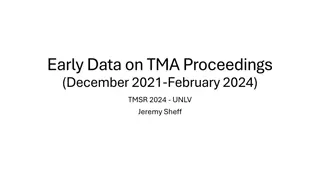

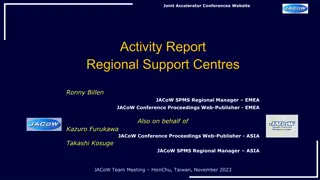



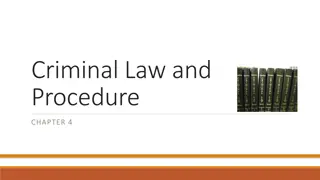
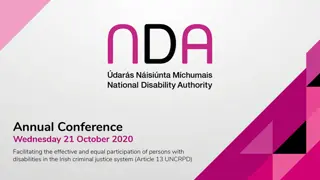
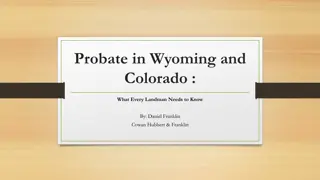
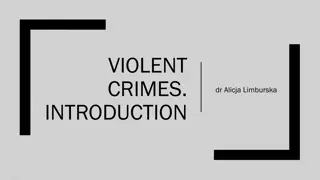
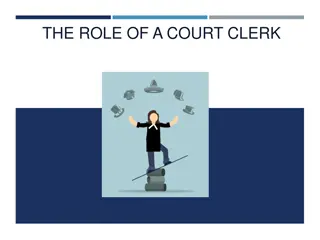

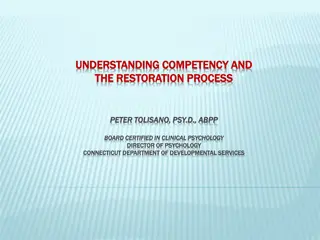

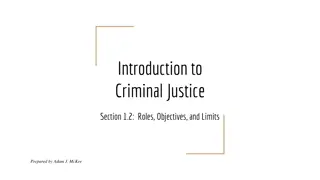
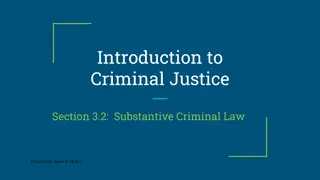
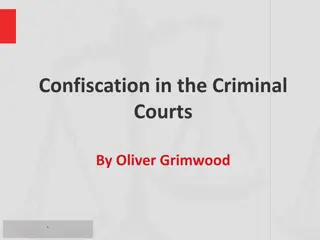

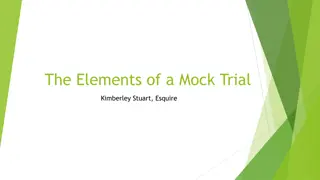
![Briefing on the Criminal Procedure Amendment Bill [B12-2021] to the Portfolio Committee on Justice and Correctional Services](/thumb/157093/briefing-on-the-criminal-procedure-amendment-bill-b12-2021-to-the-portfolio-committee-on-justice-and-correctional-services.jpg)
